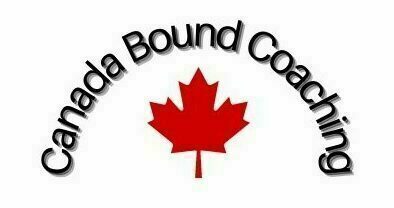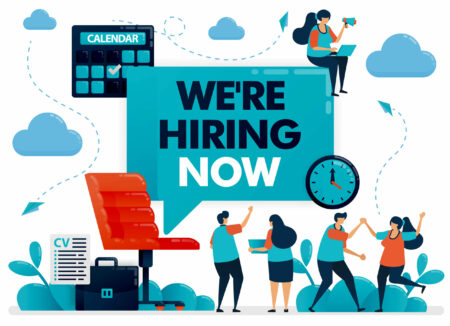Inside: Looking for jobs in Canada can be challenging. Try going to job fairs and find out how they can be so useful.
Job fairs pop up in spring, then again in November and if you are looking for work, you may want to go see them for yourself. You may not end up with a job offer, but fairs can surprise you with something of value you don’t expect.
It’s worth your time to be reminded of what you are really doing and how to chart your next career move. I happen to know as I have been to some of them where I had an epiphany about my career path.
What are Job Fairs?
Also called career fairs or career expos, these are organized events (virtual or in-person) where employers and job seekers converge. Held in your computer screen, or much better, in conference centers, hotel ballrooms, at the organization’s lobby or auditorium, it’s a time and place for recruiters to showcase company culture, job openings, and employment opportunities.
As a job seeker, this is a unique opportunity to speak to employers, to walk from booth to booth, hand out your resume, and sometimes even land an interview on the spot.
One has to come prepared and professionally dressed, though the setting is more relaxed than a formal interview.
The event attracts as a live marketplace for jobs where your presence and interactions could lead to your next opportunity.
In this digital age, job fairs, in my experience, are not to be seen as obsolete at all.
My First – time Experience
When I was new to Toronto coming from Calgary in early 2000, I attended some job fairs on-site following advice of career coaches from government employment centres. I was also curious. As advised, I was armed with hard copies of resume, a self-made business card and a rehearsed pitch to purposely introduce myself to potential employers.
My fresh graduation from the University of Calgary gave me a boost of confidence as I now have a Canadian education. I went around and attempted to start conversations that only ended in handing out my resume. Some people took a quick look at it, others just put it aside on a file.
Related post: Best life ever as International Student in Calgary
One person bothered to speak to me to ask about my background and I told them. They needed marketing graduates with Canadian experience. My education was in media communications and of course, I had limited Canadian experience at that time.
At the fairs, when I should be more extrovert, more outgoing, savvy, eloquent, persuasive, I had shied away from being one. I realized I was no longer comfortable. I was intimidated by others whose English was their first language; who I thought were “cool” and were competitive because they had a network. I barely had a network then. I was just starting to build it.
I was not into sports, did not run the marathon, did not do fundraising, did not have many well-connected friends who I can go out with on Thursday nights. I mention these after-work activities and social lives of typical young professional Canadians in Toronto as what I perceive to be backgrounds of more qualified professionals in the field.
It was rather foolish of me to think I can compete, be updated, be on top of things with my quiet, conservative, newcomer immigrant lifestyle. Not on the field I was trying to get in. Not good enough.
As I watched the other newcomers like me at the job fairs interacting with the crowd, hoping to get noticed, wishing to put the best foot forward, I wonder what their chances were. Surely, they had different experiences and education than I did. Maybe some of them made connections and got lucky to be offered a job.
I did not feel confident enough to present myself better; to mention that I have some volunteer experience in Calgary that can be considered Canadian experience.
I have skills that were transferable to positions I can qualify for, but didn’t bother mentioning it. My outlook was not so bright about landing a job though my spirit was not down either.
I contemplated on the experience and knew I picked up ideas.
My Learnings and What I Did
Looking back, I didn’t see career fairs as wasting time. The buzz, the crowd, the positive vibe, the promotions, the optimism, the audacity of job seekers swirled around me, spotlighting me to reflect.
Career fairs for me, were not so much of the following: direct interaction with employers, an opportunity to build my network; and the spot interviews or phone calls later. Instead, the events had that energy so transforming it exposed what the competition’s face looks like, the insight into the company culture, and most of all, my introspection.
I looked inward more and saw my strengths and what niche I belong to.
Job fairs informed me my personality does not suit the field I was trying to get into, which was the private sector communications practice, such as public relations, broadcast TV, advertising and corporate communications.
I positioned myself to get jobs that require an extrovert, well-connected and quite a flamboyant person.
As new immigrant then, I didn’t see myself as such and therefore didn’t project as one.
Also, this was the early days of the email and internet was just being launched. The mind-boggling reach of social media was unknown. So, I did up-skilling. I mingled with people while I did free computer workshops, joined writing groups, networking and job searching workshops.
I caught up with reading, to know more about Canadian current events, way of work and life.
At St. James Town, I became editor of a quarterly neighbourhood newsletter. I was engaged, volunteering at community centres along Sherbourne-Wellesley streets, the heart of downtown east Toronto.
My Realization
A light bulb switched on. I had come to resolve that I will seek a career in the communications field, but in a space where my personality and lifestyle fit. That’s when I turned my attention to the not-for-profit sector.
I was happy to discover the work culture and environment of the not-for-profit was different, more fulfilling than the corporate world. My naively structured job search during the fairs turned out to be a career soul search.
Since then, I started at one not-for-profit, community centre to another until I reached the healthcare field. With a paid job, I continued to volunteer, also related to communications and community work.
Do you have experiences with job fairs in Canada? Share them in the comment section below.
Vector from : Vecteezy


It was great to read about your personal experience at a job fair, and you are right, even though it can be intimidating, you need to get out there, hand out your resume and find out what is available in the job market. Even if nothing transpires for you, you will be richer for the experience.
I wish we had these sorts of fairs in South Africa. It must be great to be able to walk around and pick and choose where you would like to work and get a glimpse of the internal workings of the companies.
Hi Michel,
Thank you for finding the value of job fairs. It’s indeed an advantage to be in Canada and have these fairs, virtual or on-site. I think these days there’s fewer and fewer job fairs, but then there’s other ways of landing a job. True, the glimpse as you mentioned is important as not every prep work can be read; a lot of info out there can be gained if we step out, be with people and interact with them. I hope that in your place, they will soon try to do one. Or maybe you can suggest to companies to try and do it! Good luck.
Such a great read! This article is helpful not only for new immigrants but also for those who have been living in Canada for a while.
Hi Odette,
Yes, looking for jobs is challenging, especially for new immigrants, and attending job fairs will help them navigate this task and who knows, right then and there, one or more employers in the job fair might be suitable or waiting for them.
Thanks for reading.
Marita
Some of these questions I have I hope will invite thoughtful reflection and honest feedback, turning this debate into a meaningful discussion about strategy, personal experience, and evolving trends at Canadian job fairs.
I saw an article saying job fairs have morphed more into ‘networking hubs’ than immediate hiring events, what’s your take on that? Whilst others say, “fairs feel pointless, ’you’re just pointed to QR codes’ or told to apply online anyway. Have you experienced that?”
I also read that 50% of students got interview offers, and 24% got jobs from fairs. Does that surprise you? Maybe smaller companies are more active there. If that is the case what’s your prep strategy when going to a fair? Research companies in advance? Bring paper resumes or just LinkedIn QR codes? Do you go with the mindset of networking, ‘building connections for the long game’ or still hoping for that instant on‑site offer?
Have you ever walked away thinking, ‘I learned more about industries and people than actual jobs? How does that factor in your decision to attend future fairs?
Kind regards,
Martin
Thanks for your post, Martin. Job fairs have morphed into hubs to network, as opposed to immediate hiring, or on the spot. That’s the goal. My blog was based on my experience years ago when digital methods were not in vogue, so no QR codes then. No time wasted by going and indulging in these fairs, right? Job hunters may find other ways other than fairs that work for them; we respect that. No surprise in the stats you cited. Job seekers can be as creative and as bold as they can; research is at everybody’s fingertips these days. LinkedIn is huge, a hub waiting to be tapped. Building connections is indeed long term, job hunting or not. Keeping connections and nurturing relationships is a win-win, hands down.